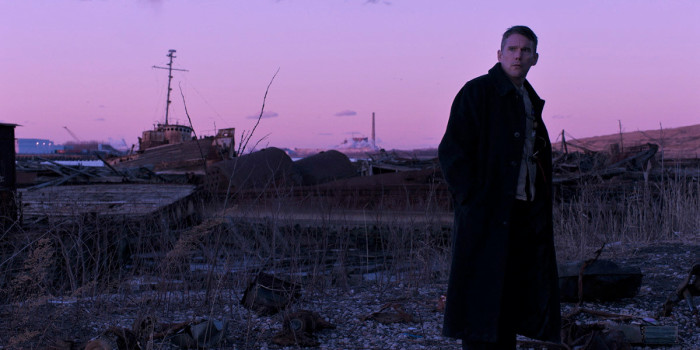'First Reformed' Review: Paul Schrader Crafts A Modern Masterpiece About Faith [TIFF]
We've quietly entered a renaissance of master American filmmakers tackling religious subjects with the gravity, dignity and seriousness they deserve. Add Paul Schrader's latest movie First Reformed to a growing list of modern masterpieces on faith through hardship that includes Martin Scorsese's Silence, Terrence Malick's The Tree of Life, the Coen Brothers' A Serious Man and James Gray's The Immigrant.
Read our full First Reformed review from TIFF below.
Schrader's work stands out in this group, however, as the only one to take place in the present day. First Reformed is an essential parable for the Trump era about the role of the church in the most pressing moral and political issues facing our world. Through the tortured consciousness of Ethan Hawke's Reverend Ernst Toller, a former military chaplain turned custodian of a historical Calvinist church, Schrader explores a country's moral malaise and the seeming inability of mainline Christianity to mobilize against it.
In his capacity presiding over the 250-year-old First Reformed Church in upstate New York, Toller provides more care to the historical building than he does to parishioners. His architectural tours of the facilities draw comparable crowds to his worship services. Toller grapples deeply with his faith, even going to the extent of transcribing his thoughts in a hand-written journal, only to see most of his efforts put toward the public relations spectacle of First Reformed's anniversary celebration featuring the governor and underwritten by an oil baron.
From the outset, Schrader clearly articulates the dissonance between the priest that his congregation needs Toller to be and the one he feels God calls him to be. He's also fully aware that his style of practicing Christianity diverges sharply from the prevailing style of the day, a prosperity Gospel-based evangelicalism paradigmatically represented by the film's Abundant Life Church. It looks like a sterile office building, not a house of worship. The corporatist language employed by its pastor, Cedric the Entertainer's Reverend Joel Jeffers, shows how the church leadership takes that structure to heart.
In Toller's mind, the modern church – especially megachurches – exist as little more than lapdogs for corporate interests. These organizations are willing to turn a blind eye to the misdeeds of their corporate benefactors in exchange for a hefty check slipped in Sunday's offertory. The gifts buy the church's silence and complicity while also implicitly validating the activities of big business that run directly contrary to Christian ideals of justice and equality.
So it makes sense that Toller, not Jeffers, is the one to receive the troubled environmental activist Michael (Philip Ettinger) for spiritual counseling. Michael, who's soon to become a father, agonizes over the morality of bringing a child into a world he believes doomed to die. In a private session with Toller, he bemoans humanity's lack of responsiveness to the pressing environmental concerns of our time. Michael considers the empathy of our species unable to project far enough into the future to make the changes necessary to secure a bountiful life for his child.
The talk reawakens an activist streak in Toller, who still struggles with the loss of his son in the Iraq War – a misguided conflict into which he encouraged him to fight. From the pulpit, Toller sticks primarily to the spiritual realm when preaching. But when guiding guests through his edifice, he's reminded of the historical role the church has played in the battle against injustice. First Reformed itself served as a stop along the Underground Railroad helping slaves escape to freedom in Canada. After being told enough to stay in his lane and stop being so political by the fat cats who benefit from Christian silence, Toller eventually decides not to let these special interests neuter the church and suppress his opposition.
First Reformed charts Toller's turbulent internal journey, which heads to dark and disturbing corners of his mind, with an emotional reserve as chilly as the film's wintry weather. None of this is surprising given Schrader's well-documented affinity for directors such as Bresson and Dreyer, but the steadiness of this aesthetic rigor helps balance a film daring to ask some thorny questions about how actively religion should participate in the public square – as well as how much they should bring those issues into their churches. And Hawke, both deeply expressive and internal as Toller, adds a human spin on the issues to really drive them home.
Their combined efforts form a powerful challenge to Christians, without derision or condescension, to live up to their stated values and honor their sacred text. At the very least, apathy in the face of flagrant immoral and unjust deeds in the world should be taken off the table for any who take the time to thoughtfully engage with First Reformed.
/Film Rating: 10 out of 10

